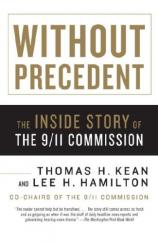Without Precedent: The Inside Story of the 9/11 Commission
Review
Without Precedent: The Inside Story of the 9/11 Commission
The smoke, flames, dust and horror of September 11, 2001 still hang
in the American air five years later.
The 2004 book-length report of the special commission rather
reluctantly appointed by President Bush to delve into the why and
the how of those terrorist attacks was widely hailed for its
literary style, thoroughness and nonpartisan approach. It still
sells well in bookstores. Now the two men who chaired that
commission have told the story of the investigation itself.
Thomas H. Kean, former Republican governor of New Jersey, and Lee
H. Hamilton, a former Democratic congressman from Indiana, were not
the original choices for their seemingly thankless task. Henry
Kissinger and George Mitchell, President Bush's initial choices,
had both resigned. Kean and Hamilton, their successors, tried hard
to keep the inquiry free from the partisan pressures of the 2004
Presidential campaign. They strove for unanimity and tried to
concentrate on simply setting forth the facts, with no attempt to
spin them one way or another.
It was a rough road. The commission was denounced by some,
dismissed as a sham effort that was "set up to fail," and disputed
on some key factual points. Their very public labors were watched
critically by a horde of people with huge egos and vested
interests, among them the families of the 9/11 victims, the many
federal, state and local government agencies involved, the two
jousting political parties and the usual gaggle of crackpot
conspiracy theorists unwilling to let mere facts get in their
way.
Part of the problem was the wide scope of the commission's mandate.
It was not just a matter of determining what happened and who was
responsible on September 11th. Also on the table were the history
of the al Qaeda terrorist movement, ramifications for foreign
policy, ways to improve emergency response, details of terrorist
financing and a host of other issues. Originally budgeted at a
paltry $3 million by a Congress that seemed to want it to fail, the
commission managed to get that figure raised to $14 million and its
mandated life extended by two months.
Despite their efforts to be as non-judgmental as possible, Kean and
Hamilton leave the impression that the administration constantly
raised obstacles, restricting their access to documents, placing
restrictions on testimony by high officials and disputing the
probers' interpretations of evidence. Two government agencies come
in for harsh criticism for lack of cooperation --- the Federal
Aviation Administration (FAA) and the North American Aerospace
Defense Command (NORAD). The well-organized and highly vocal group
of 9/11 victims families is a kind of constant offstage Greek
chorus, sharply critical one day, grateful and supportive the
next.
Several of the commission's 41 recommendations have become
commonplaces since 9/11 --- the need for better emergency
communications among responders when a great catastrophe strikes
and the need for set policies to designate who is in charge on such
occasions. A follow-up "report card" issued when the commission's
report was complete gave generally mediocre grades on implementing
its 41 recommendations. Kean and Hamilton confess to great anxiety
that some of their most important ideas have still not been acted
upon five years out.
The book gains added interest by its humanizing of the 10
commission members, its candid acknowledgment of their biases and
its admission that there were indeed passionate disagreements among
them, despite their willingness to end up with a unanimous report
and no dissenting minority briefs. There are moments of high drama
and a supporting cast of unsung heroes, people who did brave deeds
but never became celebrities.
One important question is left unanswered: Did Kean and Hamilton
employ a ghost writer? Benjamin Rhodes, a Hamilton aide, is
credited on the title page and --- ambiguously --- in the
acknowledgments. How much of this text is his?
There oughta be a disclosure law on this. Let's appoint a
commission to draft one.
Reviewed by Robert Finn (Robertfinn@aol.com) on January 24, 2011
Without Precedent: The Inside Story of the 9/11 Commission
- Publication Date: April 24, 2007
- Genres: Current Affairs, Nonfiction
- Paperback: 400 pages
- Publisher: Vintage
- ISBN-10: 0307276635
- ISBN-13: 9780307276636




